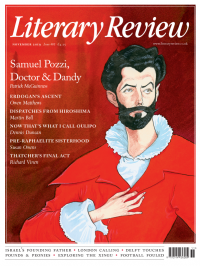Violet Hudson
Marian Evans, the Radical
In Love with George Eliot
By Kathy O'Shaughnessy
Scribe 385pp £16.99
A wise reader once remarked to me that reading George Eliot is like having a conversation with one’s cleverest, most clear-eyed friend. In which case, In Love with George Eliot is like peeking into their diary and learning their secrets. Kathy O’Shaughnessy’s novel follows Marian Evans (Eliot’s real name) from her first steps into London literary society to her death in 1880 at the age of sixty-one. O’Shaughnessy draws liberally on letters, diaries and articles written by both Evans and her circle, which give the novel the tinge of a historical document and lend it depth and veracity.
We see the development of her gargantuan mind and exquisite sensibility as she makes tentative forays into writing. We see, too, her social ostracism as she lives openly with George Henry Lewes, a married man. Evans is brave and penetrating, self-reflective almost ‘to the point of sickness’. But she is also thin-skinned and deeply sensitive, desperate for approval and full of ‘some supplicating need’. O’Shaughnessy is more interested in Evans’s private and inner life than in her proto-feminism or radical atheist convictions. Thus we spend much time at home alone with Evans and Lewes, seeing how he becomes her gatekeeper and protector, shielding her from harsh words. She turns to writing in part as a way to communicate with the world: ‘writing had offered her the freedom to speak, which felt beautiful … In real life she spoke to so few people.’
O’Shaughnessy also lingers on Evans’s relationship with her estranged, adored brother Isaac, who disowned her following her adulterous elopement. Suddenly, through this lens, Eliot’s novels seem to burst with siblings: Tom and Maggie Tulliver, Ezra Cohen and Mirah Lapidoth, Rosamond and Fred Vincy. There are enjoyable cameos from Anthony

Sign Up to our newsletter
Receive free articles, highlights from the archive, news, details of prizes, and much more.@Lit_Review
Follow Literary Review on Twitter
Twitter Feed
It wasn’t until 1825 that Pepys’s diary became available for the first time. How it was eventually decrypted and published is a story of subterfuge and duplicity.
Kate Loveman tells the tale.
Kate Loveman - Publishing Pepys
Kate Loveman: Publishing Pepys
literaryreview.co.uk
Arthur Christopher Benson was a pillar of the Edwardian establishment. He was supremely well connected. As his newly published diaries reveal, he was also riotously indiscreet.
Piers Brendon compares Benson’s journals to others from the 20th century.
Piers Brendon - Land of Dopes & Tories
Piers Brendon: Land of Dopes & Tories - The Benson Diaries: Selections from the Diary of Arthur Christopher Benson by Eamon Duffy & Ronald Hyam (edd)
literaryreview.co.uk
Of the siblings Gwen and Augustus John, it is Augustus who has commanded most attention from collectors and connoisseurs.
Was he really the finer artist, asks Tanya Harrod, or is it time Gwen emerged from her brother’s shadow?
Tanya Harrod - Cut from the Same Canvas
Tanya Harrod: Cut from the Same Canvas - Artists, Siblings, Visionaries: The Lives and Loves of Gwen and Augustus John by Judith Mackrell
literaryreview.co.uk